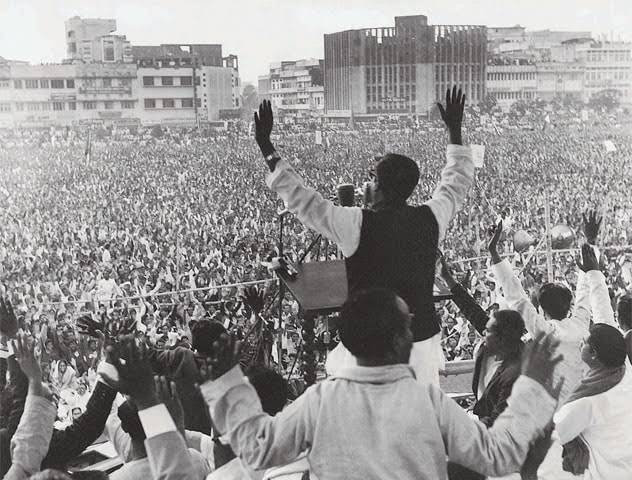
The year 1970 was the most important year in Pakistan’s history. The events which occurred then continue to shape Pakistani politics, culture and society to this day. I have attempted to write about some of them in these pages throughout this year.
Right from the announcement by then-Pakistani military ruler General Yahya Khan in early 1970 calling for democratic elections in the December of that year following the Martial Law and announcing political freedoms in the country allowing for election campaigning by political parties as per the Legal Framework Order, 1970 (LFO) which was a decree that laid down the political principles and laws governing the 1970 general election, which was the first direct elections in the history of Pakistan. The LFO also dissolved the "One Unit" scheme of West Pakistan, re-establishing the four provinces of Punjab, Sindh, Balochistan and the then-Northwest Frontier Province. Yahya instituted the Legal Framework Order (LFO) on March 30, 1970, with the aim to secure the future constitution.
1. PAKISTAN’S ‘OTHER’ 1970: Exactly a week before the issuance of the LFO by the military regime, a seminal event was held on March 23 - Pakistan Day – in Toba Tek Singh, a city in Punjab, which though unrelated to the larger scheme of events which occurred in that eventful year of 1970, occupies a distinct and important place if one were writing an alternative history of Pakistan. And in the context of the ongoing Farmers Protests in neighbouring India – which has now entered its fourth month as I write this – its memory and legacy is not unimportant.
The 1970 Toba Tek Singh Kisan Conference is also historic because its memory and legacy is associated with one of the greatest poets of the 20th century, the iconic Faiz Ahmad Faiz.
The Kisan Conference at Toba Tek Singh is not just important because Faiz participated in it and because the verses he recited there were made a target of criticism, but this conference itself is an unforgettable historic event.
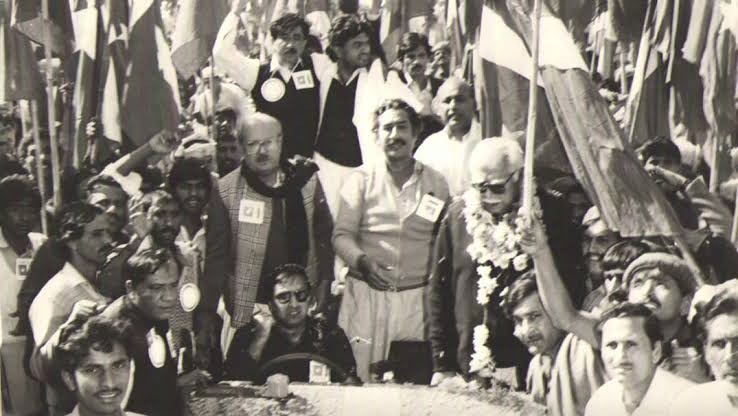
The day was 23 March 1970. The Kisan Conference which took place in Toba Tek Singh on 23 March 1970 is also especially important given that here in united Pakistan it was the last gathering in which representatives of all classes of both wings of the country participated. The conference was presided over by Maulana Abdul Hamid Khan Bhashani.
The president of the reception council of the conference Sardar Shaukat Ali began his welcome address as follows:
Honourable President! The great leader of the workers of Pakistan, Maulana Abdul Hamid Khan Bhashani, the leader of the workers and peasants of East Pakistan, the leaders of various political parties, labour organizations and students, progressive intellectuals and labouring peasants of villages, workers and ladies! I warm welcome you all from the Reception Committee of the Kisan Conference. You have added a new era and revolutionary chapter in the history of Pakistan by participating in this grand conference of peasants and labourers. For the first time in West Pakistan, workers, revolutionary students and intellectuals by participating in such large numbers in this great gathering of peasants have indicated the people’s unity without which no far-reaching change in Pakistani society can be effected.
Sardar Shaukat Ali proceeding further, explaining the purpose of the conference in his welcome address says:
These extracts from Sardar Shaukat Ali’s welcome address supply the ideological foundation of the conference. But the estimate of the conference being a mob and its form and expanse was made by Taoos Khan, a labour leader of his time as follows:
On the evening of 22 March walking in the tent from one end to another when I saw its length and width I was surprised. I was surprised that what was the need of such a big tent and prayed to God to preserve the good name of the peasants and workers. But on the second day when I reached the conference at 10 am, I was surprised to see the whole tent was full. Thousands of men were standing outside the tent right and left and a flood of peasants was coming in from outside which spread from the tent for hundreds of yards onto the vast field and roads. I danced with joy seeing this. I kept raising cries of Kisan Zindabad, Peasant Worker unity Zindabad.
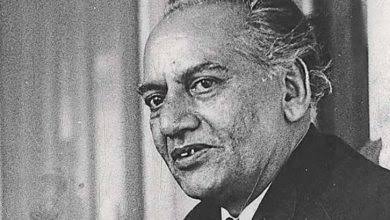
Faiz recited a few verses from his work appropriate for the gathering and got a lot of appreciation from the attendees. He also recited a few lines from his long poem ‘Phir barq farozaan hai sar-e-vaadi-e-seena’ (The lightning again becomes luminous atop the Sinai Valley:
Har aik oolil amar ko sadaa do
Ke apni fard-e-amaal sambhale
Utthe ga jab jamm-e-sarfaroshaan
Parenge daar-o-rasan ke laale
Koi na ho ga ke jo bachaa le
Jazaa sazaa sab yaheen pe ho gi
Yaheen azaab-o-savaab ho ga
Yaheen se utthe ga shor-e-mehshar
Yaheen pe roz-e-hisaab ho ga
(Call out to every man of authority
To handle his sheet of deeds
When the diehard multitudes will rise
When the gallows will be held dear
No one will be saved from there
Here will be decided the reward and punishment
As well as recompense and chastisement
From here will rise Doomsday’s tumult
As well as the Day of Judgement.)
A week to ten days after the conference, the weekly Zindagi which was once edited by the eminent conservative journalist and analyst of today Mujeeb-ur-Rehman Shami published a really detailed 8-page article about the conference which was published in the Zindagi issue dated 6 April 1970. The writer was Mr Abdul Ghani Farooq.
The learned writer wrote the report of the conference with a lot of detail and from his point of view overlooking its importance and objectives made it a target of sarcasm and ridicule. Vide a corroborating headline of his article below:
The darkness of socialist thought in Toba Tek Singh (This statement is given below the photo of a bookstall)
The hell of the red books of Marx and Lenin is burning within this stall.
This bookstall belonged to the renowned progressive publisher of South Asia People's Publishing House.
At the end of the article, instead of presenting some alternative point of view to the conversation occurring at the conference, an attempt has been made to seek the support of the Martial Law regulations. The learned writer has written:
The Toba Tek Singh conference ended. But left many unanswered questions. Such unanswered questions to answer which is the duty of the various Martial Law regulations and upon which depends our present and future.
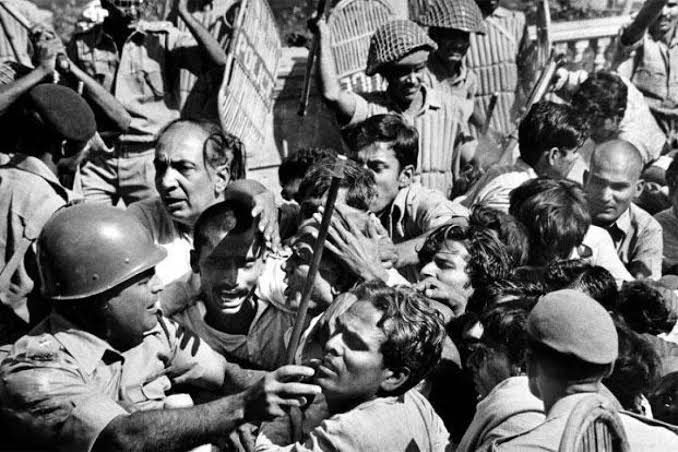
2. A DEATH IN KARACHI: Inhi pathharon pe chal kar agar aa sako to aao
Mere ghar ke raaste mein koi kahkashaan nahi hai
(If you wish to come, you must take the stony road
The stars do not light up the way to my abode.)
Then in the October of that year Pakistan lost one of its most promising civil servants and poets Mustafa Zaidi, who had already been a victim of Yahya’s infamous ‘303 purge’ of bureaucrats on charges of corruption. On October 12, after celebrating his 90th birthday just a couple of days earlier on October 10, Zaidi died young, and the circumstances of his death were lurid, involving extramarital liaisons, a suicide pact with a lover who survived, and dark accusations of murder. Rather unfortunately, these issues have tended to overshadow discussions about his considerable talent. Zaidi should have been seen as one of the stalwarts of the Progressive movement in Pakistan in the 1960s, but his due has mostly eluded him, partly because of the rather colourful posthumous publicity that enveloped him.
Zaidi’s first book, Raushni, was published when he was merely nineteen years old, and still in India. He moved to Pakistan in the early 1950s, and after a brief stint in academia, went on to become a senior civil servant. His career ended badly when he was dismissed during Yahya Khan’s purge of 303 bureaucrats in 1970. His death shortly after led to the murder trial of his paramour, which assumed the status of a media circus. During that time, several literary journals brought out special issues on his work. Eventually, his Kulliyaat (complete works) was published in the mid-1970s, which also included some of the most superlative praise of his work by Faiz, Firaaq and Josh. However, he was strangely ignored by the intelligentsia.
A society where one is allowed to hate a human but not love him; where the standard of humanity and decency is not the beauty of morals but a purse of money; where the purity of passion and emotion and truth of art and skill is injured by the whip of the censor; where expression of self is a crime though there is no limit upon the active markets of deceit and hypocrisy and where the blood of man is cheap and the facilities of justice and equity are costly, there the death of Zaidi, Manto, Majaz, Saghar and Sara Shagufta taking place is indeed a place for wonder but not a place for regret.
So his famous qataa is that:
Din ki ik ik boond giraan hai, ik ik juraa-e-shab nayaab
Shaam-o-sehar ke paimaane mein jo kuchh hai dar dar ke piyo
Aahista aahista barto in ginti ki saanson ko
Dil ke haath mein sheesha-e-jaan hai qatra qatra kar ke piyo
(Every single drop of the day is costly, every single sip of the night is rare
Whatever lies within the measure of night and day, consume it with fear
Gradually expend these limited breaths
The mirror of life is held by the heart, drink drop by drop, beware.)
The untimely death of Mustafa Zaidi – most certainly a planned assassination – was the only cultural tragedy in an otherwise political year, but it was one from which neither the united Pakistan of the military generals nor the Naya Pakistan proclaimed by ZAB in December 1971 a year later fully recovered.
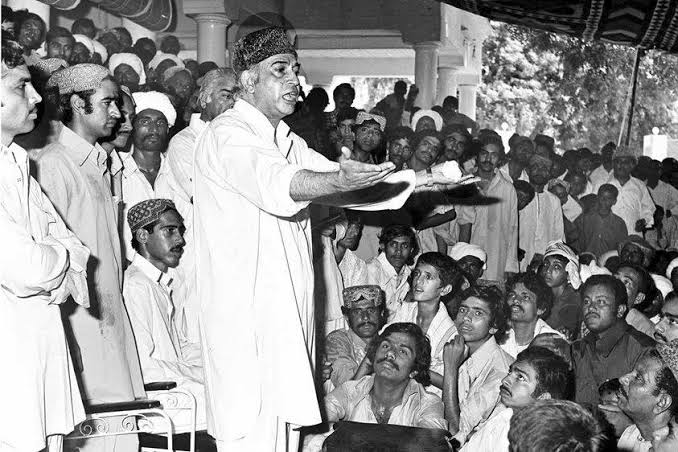
3. A POLISH TRAGEDY IN KARACHI: November of that year began with the Polish delegation arriving at the Karachi airport being attacked by an Islamic fundamentalist. On November 1, 1970, the Polish deputy foreign minister Zygfryd Wolniak was killed at Karachi airport during welcome ceremonies by a Pakistan International Airlines (PIA) employee and anti-communist Islamic fundamentalist named Mohammed Feroze Abdullah, who was trying to kill the entire delegation but was aiming for Polish President Marian Spychalski in particular. Driving a PIA cargo lorry at high speed, he mowed down the delegation and narrowly missed his intended target. The other three victims were Pakistani – the deputy director of the intelligence bureau, Chaudhri Mohammed Nazir, and two government photographers. His stated motivation to the interrogators was his desire to kill socialists, believing that socialists and socialism were against Islam and Muslims. This occurred on the eve of Pakistan’s first general elections in December 1970 in which right-wing Islamic parties such as the Jamaat-e-Islami (whose main stronghold at the time was Karachi) were employing highly incendiary rhetoric against socialists as part of their election campaigns. Feroze was sentenced to death by a special military court on May 10, 1971, but permitted to appeal for clemency.
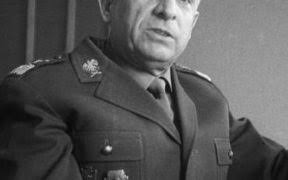
The details of this tragedy published at that time pointed to two aspects – administrative and political. As far as administrative matters are concerned, the finesse which the authorities in Karachi displayed was evident in that the two senior police officers responsible for protective measures were suspended on account of negligence from their duties.
The penetration of the van unhindered into the crowd, where the Polish president and the Sindh governor as well as other eminent personalities were also standing, itself suggested that the administrators had neither created an enclosure of protective divisions around the airplane, nor were any precautionary measures undertaken while the Polish president and other members of the goodwill delegation were conversing with the guests.
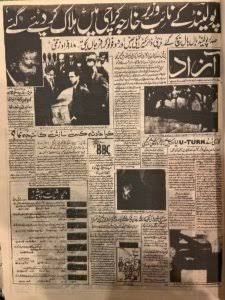
It appeared from the news of the national press that Feroze was an active member of the PIA’s ‘Islamist’ union and his association with the Jamaat-e-Islami was also no longer a secret. This union had created a climate of violence at Karachi airport and beating up socialists had become the custom of the union workers.
Pakistan’s international repute was turned to dust because of this tragedy and the head of every Pakistani bowed in shame and regret.
4. THE CYCLONE THAT CREATED BANGLADESH: A week after the Karachi airport tragedy the Bhola cyclone struck then-East Pakistan wreaking colossal and unprecedented death and destruction on November 11, 1970. It remains the deadliest tropical cyclone and natural disasters ever recorded. At least 5,00,000 people lost their lives, primarily due to the storm surge that flooded much of the low-lying islands of the Ganges delta. This was the sixth cyclonic storm of the 1970 North Indian Ocean cyclone season, and also the season’s strongest.
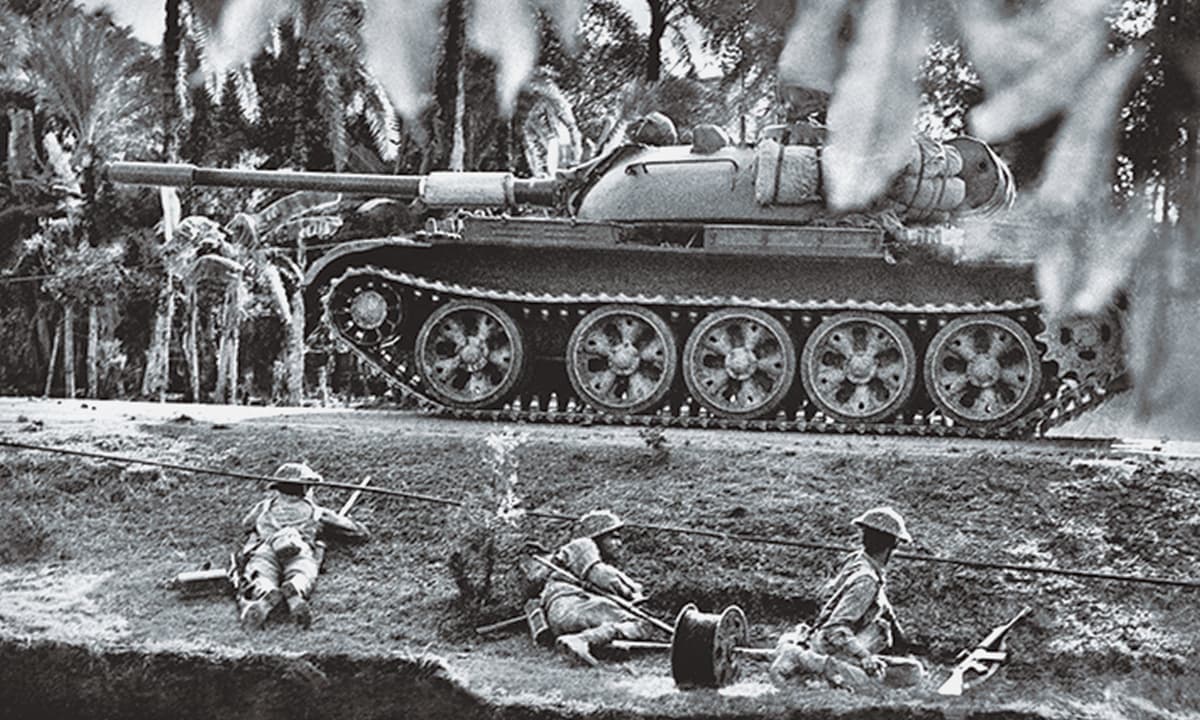
The Pakistani government, led by junta leader General Yahya Khan, was criticised for its delayed handling of the relief operations following the storm, both by local political leaders in East Pakistan and international media. During the election that took place a month later, the opposition Awami League gained a landslide victory in the province, and continuing unrest between East Pakistan and the central Pakistan government triggered the Bangladesh Liberation War, which led to widespread atrocities and eventually concluded with the creation of the country of Bangladesh.
Pakistan Press International (PPI) had reported at that time that due to the sudden termination of the traditional method of announcement of danger by the Meteorological Department via Radio Pakistan the people of coastal areas and coastal islands had no idea of the severity of the danger.
The leader of the National Awami Party Maulana Abdul Hamid Bhashani had said this alone was indication enough that the government did not take necessary measures to save people from the cyclone.
The details of the project for reconstruction of the affected areas were kept a secret. Government officials handled it and there was no intervention by representatives from East Pakistan or those from the affected areas in the preparation of this plan.
In addition to the engagements of the then US ambassador to Pakistan, political leaders of East Pakistan also objected to the presence of British forces. The Dhaka newspaper Azad revealed at the time that the American government was ready to give aid for the control of floods and cyclones and other development projects but was desirous of establishing a naval base at Chittagong in lieu of it.
However all of this came to naught as the Awami League, headed by Sheikh Mujibur Rahman, swept up a landslide victory in the national elections on December 7, 1970, largely in part due to the dissatisfaction over relief efforts by the national government. The elections for nine national assembly and eighteen provincial assembly seats had had to be postponed until January 18, 1971 as a result of the storm.
The government’s handling of the relief efforts helped exacerbate the bitterness felt in then-East Pakistan, swelling the resistance movement there. Funds trickled very slowly and transport was slow in bringing supplies to devastated regions. As tensions increased, by March 1971, foreign personnel evacuated because of fears of violence.
The situation developed into the Bangladesh Liberation War, widened into the Indo-Pakistani War of 1971 in December and concluded with the creation of Bangladesh. A natural event had helped to trigger a civil war.
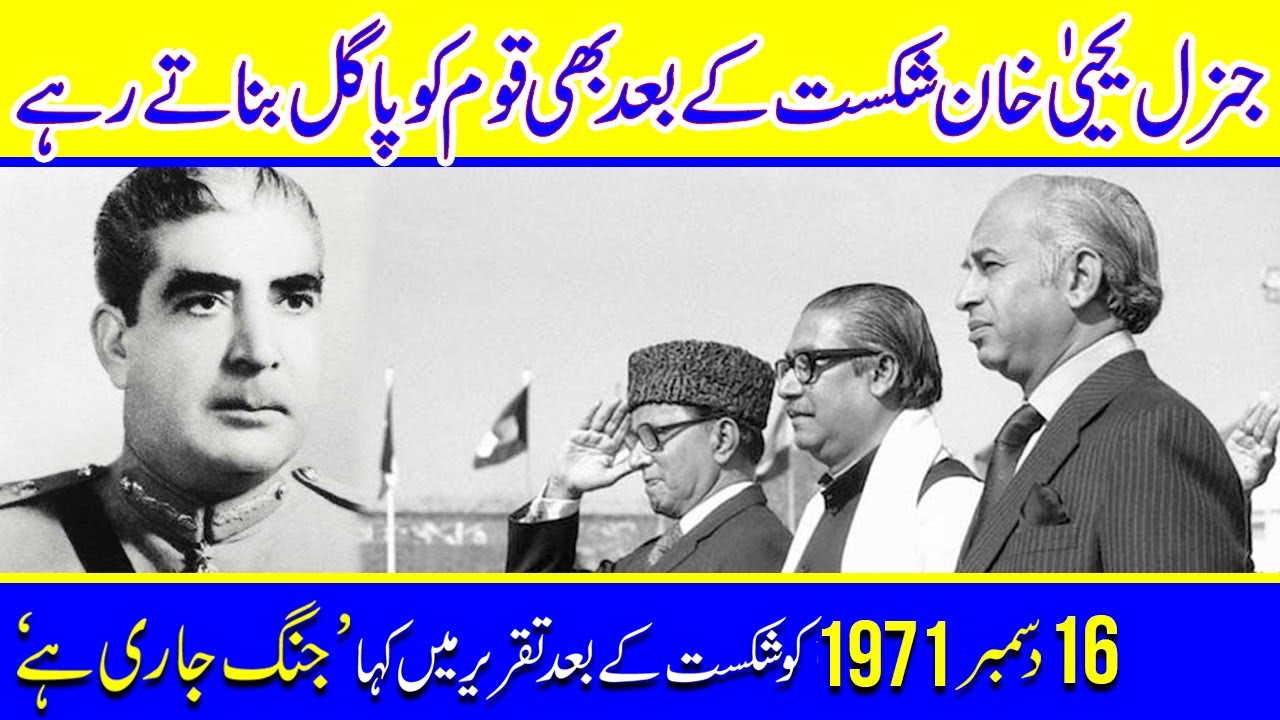
5. THE ELECTIONS THAT BROKE PAKISTAN: Within four weeks of the striking of Bhola Cyclone, the unprecedented general elections held on December 7 and their unsavoury aftermath would seal the fate of united Pakistan as it was then.
General elections were held in Pakistan on December 7, 1970 to elect members of the National Assembly. They were the first general elections since the independence of Pakistan and ultimately the only ones held prior to the independence of Bangladesh. Voting took place in 300 constituencies, of which 162 were in East Pakistan and 138 in West Pakistan.
The elections were a fierce contest between two social democratic parties – the west-based Pakistan Peoples Party (PPP) of Zulfiqar Ali Bhutto and the east-based Awami League of Sheikh Mujibur Rahman. The Awami League was the only major party in the east wing, while in the west wing, the PPP faced competition from the conservative factions of the Muslim League – the largest of which was Muslim League (Qayyum), as well as Islamist parties like the Jamaat-e-Islami (JI), Jamiat Ulema-e-Islam (JUI) and Jamiat Ulema-e-Pakistan (JUP).
The result was a victory for the Awami League, which won an absolute majority of 160 seats, all of which were in East Pakistan. The PPP won only 81 seats, all in West Pakistan.
In the provincial elections held ten days later, the Awami League again dominated in East Pakistan, while the PPP won Punjab and Sindh. The Marxist National Awami Party emerged victorious in the Northwest Frontier Province and Balochistan.
The National Assembly was initially not inaugurated as the military dictator Yahya Khan and the PPP chairman Zulfikar Ali Bhutto did not want a party from East Pakistan heading the federal government. Instead, Yahya appointed the veteran Bengali politician Nurul Amin as prime minister, asking him to reach a compromise between the PPP and Awami League. However, this move failed as the delay in inauguration had already caused significant unrest in East Pakistan. The situation escalated into a civil war that led to the breakup of Pakistan and the formation of the independent state of Bangladesh. The assembly was eventually inaugurated in 1972 after Yahya resigned and handed power to Bhutto. Bhutto became prime minister in 1973 after the post was recreated by a new constitution.
By voting the way they did, the people proclaimed that they had grown weary of the then-prevalent political and social system in the country and wanted to change it as soon as possible. They stood by every such slogan and party which stood for social revolution. Ranged against them were those who claimed Islam was in danger, or that the ideology of Pakistan was in danger. Fatwas of apostasy and heresy were issued upon socialism and its supporters and the election of the National Assembly was presented as a war between Islam and evil. Extremely provocative things were said about the left-wing parties in newspapers, mosque sermons but this storm of propaganda could not influence the people. They were not deceived by the Islamists because their daily experiences had made them aware that the demon of exploitation had worn the clothing of Islamism.
Approximately two dozen political and religious parties participated in the elections. Their manifestoes emphasised a solution to the political, economic and social problems of the country and made rosy promises to the people but the results of the election showed that only two parties – the Awami League and the PPP – were acquainted with the habits and disposition of the nation and were those who had the knowledge of the pulse of the feelings, emotions and desires of the people. The motto of both these parties was socialism. On the other hand, the parties which had started off as claimants of the Islamic system to contest the election were totally unsuccessful in identifying with the mood of the common people.
Alas all of this came to naught as the elected assembly initially did not meet as the dictator Yahya Khan and Bhutto’s PPP did not want the majority party from East Pakistan to form government, as was its right. This caused great unrest in East Pakistan, which soon escalated into the call for independence on March 26, 1971 and ultimately led to a war of independence with East Pakistan becoming the independent state of Bangladesh.
The assembly session was eventually held when Khan resigned four days after Pakistan surrendered in Bangladesh and Bhutto took over. Bhutto became the Prime Minister of Pakistan in 1973, after the post was recreated by the new Constitution.
Note: All translations are by the writer.
Right from the announcement by then-Pakistani military ruler General Yahya Khan in early 1970 calling for democratic elections in the December of that year following the Martial Law and announcing political freedoms in the country allowing for election campaigning by political parties as per the Legal Framework Order, 1970 (LFO) which was a decree that laid down the political principles and laws governing the 1970 general election, which was the first direct elections in the history of Pakistan. The LFO also dissolved the "One Unit" scheme of West Pakistan, re-establishing the four provinces of Punjab, Sindh, Balochistan and the then-Northwest Frontier Province. Yahya instituted the Legal Framework Order (LFO) on March 30, 1970, with the aim to secure the future constitution.
1. PAKISTAN’S ‘OTHER’ 1970: Exactly a week before the issuance of the LFO by the military regime, a seminal event was held on March 23 - Pakistan Day – in Toba Tek Singh, a city in Punjab, which though unrelated to the larger scheme of events which occurred in that eventful year of 1970, occupies a distinct and important place if one were writing an alternative history of Pakistan. And in the context of the ongoing Farmers Protests in neighbouring India – which has now entered its fourth month as I write this – its memory and legacy is not unimportant.
The 1970 Toba Tek Singh Kisan Conference is also historic because its memory and legacy is associated with one of the greatest poets of the 20th century, the iconic Faiz Ahmad Faiz.
The Kisan Conference at Toba Tek Singh is not just important because Faiz participated in it and because the verses he recited there were made a target of criticism, but this conference itself is an unforgettable historic event.

The day was 23 March 1970. The Kisan Conference which took place in Toba Tek Singh on 23 March 1970 is also especially important given that here in united Pakistan it was the last gathering in which representatives of all classes of both wings of the country participated. The conference was presided over by Maulana Abdul Hamid Khan Bhashani.
The president of the reception council of the conference Sardar Shaukat Ali began his welcome address as follows:
Honourable President! The great leader of the workers of Pakistan, Maulana Abdul Hamid Khan Bhashani, the leader of the workers and peasants of East Pakistan, the leaders of various political parties, labour organizations and students, progressive intellectuals and labouring peasants of villages, workers and ladies! I warm welcome you all from the Reception Committee of the Kisan Conference. You have added a new era and revolutionary chapter in the history of Pakistan by participating in this grand conference of peasants and labourers. For the first time in West Pakistan, workers, revolutionary students and intellectuals by participating in such large numbers in this great gathering of peasants have indicated the people’s unity without which no far-reaching change in Pakistani society can be effected.
Sardar Shaukat Ali proceeding further, explaining the purpose of the conference in his welcome address says:
The biggest objective of this Kisan Conference is to fix the attention of the working masses and progressive workers of West Pakistan on the agrarian problem, and to tell the people that the Pakistani people can never stand on its feet until the agrarian problem is solved. The economy of Pakistan can never be freed from the fist of imperialist powers, and the agrarian problem can never be solved until the agrarian revolution is begun.
These extracts from Sardar Shaukat Ali’s welcome address supply the ideological foundation of the conference. But the estimate of the conference being a mob and its form and expanse was made by Taoos Khan, a labour leader of his time as follows:
On the evening of 22 March walking in the tent from one end to another when I saw its length and width I was surprised. I was surprised that what was the need of such a big tent and prayed to God to preserve the good name of the peasants and workers. But on the second day when I reached the conference at 10 am, I was surprised to see the whole tent was full. Thousands of men were standing outside the tent right and left and a flood of peasants was coming in from outside which spread from the tent for hundreds of yards onto the vast field and roads. I danced with joy seeing this. I kept raising cries of Kisan Zindabad, Peasant Worker unity Zindabad.

Faiz recited a few verses from his work appropriate for the gathering and got a lot of appreciation from the attendees. He also recited a few lines from his long poem ‘Phir barq farozaan hai sar-e-vaadi-e-seena’ (The lightning again becomes luminous atop the Sinai Valley:
Har aik oolil amar ko sadaa do
Ke apni fard-e-amaal sambhale
Utthe ga jab jamm-e-sarfaroshaan
Parenge daar-o-rasan ke laale
Koi na ho ga ke jo bachaa le
Jazaa sazaa sab yaheen pe ho gi
Yaheen azaab-o-savaab ho ga
Yaheen se utthe ga shor-e-mehshar
Yaheen pe roz-e-hisaab ho ga
(Call out to every man of authority
To handle his sheet of deeds
When the diehard multitudes will rise
When the gallows will be held dear
No one will be saved from there
Here will be decided the reward and punishment
As well as recompense and chastisement
From here will rise Doomsday’s tumult
As well as the Day of Judgement.)
A week to ten days after the conference, the weekly Zindagi which was once edited by the eminent conservative journalist and analyst of today Mujeeb-ur-Rehman Shami published a really detailed 8-page article about the conference which was published in the Zindagi issue dated 6 April 1970. The writer was Mr Abdul Ghani Farooq.
The learned writer wrote the report of the conference with a lot of detail and from his point of view overlooking its importance and objectives made it a target of sarcasm and ridicule. Vide a corroborating headline of his article below:
The darkness of socialist thought in Toba Tek Singh (This statement is given below the photo of a bookstall)
The hell of the red books of Marx and Lenin is burning within this stall.
This bookstall belonged to the renowned progressive publisher of South Asia People's Publishing House.
At the end of the article, instead of presenting some alternative point of view to the conversation occurring at the conference, an attempt has been made to seek the support of the Martial Law regulations. The learned writer has written:
The Toba Tek Singh conference ended. But left many unanswered questions. Such unanswered questions to answer which is the duty of the various Martial Law regulations and upon which depends our present and future.

2. A DEATH IN KARACHI: Inhi pathharon pe chal kar agar aa sako to aao
Mere ghar ke raaste mein koi kahkashaan nahi hai
(If you wish to come, you must take the stony road
The stars do not light up the way to my abode.)
Then in the October of that year Pakistan lost one of its most promising civil servants and poets Mustafa Zaidi, who had already been a victim of Yahya’s infamous ‘303 purge’ of bureaucrats on charges of corruption. On October 12, after celebrating his 90th birthday just a couple of days earlier on October 10, Zaidi died young, and the circumstances of his death were lurid, involving extramarital liaisons, a suicide pact with a lover who survived, and dark accusations of murder. Rather unfortunately, these issues have tended to overshadow discussions about his considerable talent. Zaidi should have been seen as one of the stalwarts of the Progressive movement in Pakistan in the 1960s, but his due has mostly eluded him, partly because of the rather colourful posthumous publicity that enveloped him.
Zaidi’s first book, Raushni, was published when he was merely nineteen years old, and still in India. He moved to Pakistan in the early 1950s, and after a brief stint in academia, went on to become a senior civil servant. His career ended badly when he was dismissed during Yahya Khan’s purge of 303 bureaucrats in 1970. His death shortly after led to the murder trial of his paramour, which assumed the status of a media circus. During that time, several literary journals brought out special issues on his work. Eventually, his Kulliyaat (complete works) was published in the mid-1970s, which also included some of the most superlative praise of his work by Faiz, Firaaq and Josh. However, he was strangely ignored by the intelligentsia.
A society where one is allowed to hate a human but not love him; where the standard of humanity and decency is not the beauty of morals but a purse of money; where the purity of passion and emotion and truth of art and skill is injured by the whip of the censor; where expression of self is a crime though there is no limit upon the active markets of deceit and hypocrisy and where the blood of man is cheap and the facilities of justice and equity are costly, there the death of Zaidi, Manto, Majaz, Saghar and Sara Shagufta taking place is indeed a place for wonder but not a place for regret.
So his famous qataa is that:
Din ki ik ik boond giraan hai, ik ik juraa-e-shab nayaab
Shaam-o-sehar ke paimaane mein jo kuchh hai dar dar ke piyo
Aahista aahista barto in ginti ki saanson ko
Dil ke haath mein sheesha-e-jaan hai qatra qatra kar ke piyo
(Every single drop of the day is costly, every single sip of the night is rare
Whatever lies within the measure of night and day, consume it with fear
Gradually expend these limited breaths
The mirror of life is held by the heart, drink drop by drop, beware.)
The untimely death of Mustafa Zaidi – most certainly a planned assassination – was the only cultural tragedy in an otherwise political year, but it was one from which neither the united Pakistan of the military generals nor the Naya Pakistan proclaimed by ZAB in December 1971 a year later fully recovered.

3. A POLISH TRAGEDY IN KARACHI: November of that year began with the Polish delegation arriving at the Karachi airport being attacked by an Islamic fundamentalist. On November 1, 1970, the Polish deputy foreign minister Zygfryd Wolniak was killed at Karachi airport during welcome ceremonies by a Pakistan International Airlines (PIA) employee and anti-communist Islamic fundamentalist named Mohammed Feroze Abdullah, who was trying to kill the entire delegation but was aiming for Polish President Marian Spychalski in particular. Driving a PIA cargo lorry at high speed, he mowed down the delegation and narrowly missed his intended target. The other three victims were Pakistani – the deputy director of the intelligence bureau, Chaudhri Mohammed Nazir, and two government photographers. His stated motivation to the interrogators was his desire to kill socialists, believing that socialists and socialism were against Islam and Muslims. This occurred on the eve of Pakistan’s first general elections in December 1970 in which right-wing Islamic parties such as the Jamaat-e-Islami (whose main stronghold at the time was Karachi) were employing highly incendiary rhetoric against socialists as part of their election campaigns. Feroze was sentenced to death by a special military court on May 10, 1971, but permitted to appeal for clemency.

The details of this tragedy published at that time pointed to two aspects – administrative and political. As far as administrative matters are concerned, the finesse which the authorities in Karachi displayed was evident in that the two senior police officers responsible for protective measures were suspended on account of negligence from their duties.
The penetration of the van unhindered into the crowd, where the Polish president and the Sindh governor as well as other eminent personalities were also standing, itself suggested that the administrators had neither created an enclosure of protective divisions around the airplane, nor were any precautionary measures undertaken while the Polish president and other members of the goodwill delegation were conversing with the guests.

It appeared from the news of the national press that Feroze was an active member of the PIA’s ‘Islamist’ union and his association with the Jamaat-e-Islami was also no longer a secret. This union had created a climate of violence at Karachi airport and beating up socialists had become the custom of the union workers.
Pakistan’s international repute was turned to dust because of this tragedy and the head of every Pakistani bowed in shame and regret.
4. THE CYCLONE THAT CREATED BANGLADESH: A week after the Karachi airport tragedy the Bhola cyclone struck then-East Pakistan wreaking colossal and unprecedented death and destruction on November 11, 1970. It remains the deadliest tropical cyclone and natural disasters ever recorded. At least 5,00,000 people lost their lives, primarily due to the storm surge that flooded much of the low-lying islands of the Ganges delta. This was the sixth cyclonic storm of the 1970 North Indian Ocean cyclone season, and also the season’s strongest.

The third Pakistan-India War (1971). Pakistan lost its Eastern Wing which became Bangladesh.
The Pakistani government, led by junta leader General Yahya Khan, was criticised for its delayed handling of the relief operations following the storm, both by local political leaders in East Pakistan and international media. During the election that took place a month later, the opposition Awami League gained a landslide victory in the province, and continuing unrest between East Pakistan and the central Pakistan government triggered the Bangladesh Liberation War, which led to widespread atrocities and eventually concluded with the creation of the country of Bangladesh.
Pakistan Press International (PPI) had reported at that time that due to the sudden termination of the traditional method of announcement of danger by the Meteorological Department via Radio Pakistan the people of coastal areas and coastal islands had no idea of the severity of the danger.
The leader of the National Awami Party Maulana Abdul Hamid Bhashani had said this alone was indication enough that the government did not take necessary measures to save people from the cyclone.
The details of the project for reconstruction of the affected areas were kept a secret. Government officials handled it and there was no intervention by representatives from East Pakistan or those from the affected areas in the preparation of this plan.
In addition to the engagements of the then US ambassador to Pakistan, political leaders of East Pakistan also objected to the presence of British forces. The Dhaka newspaper Azad revealed at the time that the American government was ready to give aid for the control of floods and cyclones and other development projects but was desirous of establishing a naval base at Chittagong in lieu of it.
However all of this came to naught as the Awami League, headed by Sheikh Mujibur Rahman, swept up a landslide victory in the national elections on December 7, 1970, largely in part due to the dissatisfaction over relief efforts by the national government. The elections for nine national assembly and eighteen provincial assembly seats had had to be postponed until January 18, 1971 as a result of the storm.
The government’s handling of the relief efforts helped exacerbate the bitterness felt in then-East Pakistan, swelling the resistance movement there. Funds trickled very slowly and transport was slow in bringing supplies to devastated regions. As tensions increased, by March 1971, foreign personnel evacuated because of fears of violence.
The situation developed into the Bangladesh Liberation War, widened into the Indo-Pakistani War of 1971 in December and concluded with the creation of Bangladesh. A natural event had helped to trigger a civil war.

5. THE ELECTIONS THAT BROKE PAKISTAN: Within four weeks of the striking of Bhola Cyclone, the unprecedented general elections held on December 7 and their unsavoury aftermath would seal the fate of united Pakistan as it was then.
General elections were held in Pakistan on December 7, 1970 to elect members of the National Assembly. They were the first general elections since the independence of Pakistan and ultimately the only ones held prior to the independence of Bangladesh. Voting took place in 300 constituencies, of which 162 were in East Pakistan and 138 in West Pakistan.
The elections were a fierce contest between two social democratic parties – the west-based Pakistan Peoples Party (PPP) of Zulfiqar Ali Bhutto and the east-based Awami League of Sheikh Mujibur Rahman. The Awami League was the only major party in the east wing, while in the west wing, the PPP faced competition from the conservative factions of the Muslim League – the largest of which was Muslim League (Qayyum), as well as Islamist parties like the Jamaat-e-Islami (JI), Jamiat Ulema-e-Islam (JUI) and Jamiat Ulema-e-Pakistan (JUP).
The result was a victory for the Awami League, which won an absolute majority of 160 seats, all of which were in East Pakistan. The PPP won only 81 seats, all in West Pakistan.
In the provincial elections held ten days later, the Awami League again dominated in East Pakistan, while the PPP won Punjab and Sindh. The Marxist National Awami Party emerged victorious in the Northwest Frontier Province and Balochistan.
The National Assembly was initially not inaugurated as the military dictator Yahya Khan and the PPP chairman Zulfikar Ali Bhutto did not want a party from East Pakistan heading the federal government. Instead, Yahya appointed the veteran Bengali politician Nurul Amin as prime minister, asking him to reach a compromise between the PPP and Awami League. However, this move failed as the delay in inauguration had already caused significant unrest in East Pakistan. The situation escalated into a civil war that led to the breakup of Pakistan and the formation of the independent state of Bangladesh. The assembly was eventually inaugurated in 1972 after Yahya resigned and handed power to Bhutto. Bhutto became prime minister in 1973 after the post was recreated by a new constitution.
By voting the way they did, the people proclaimed that they had grown weary of the then-prevalent political and social system in the country and wanted to change it as soon as possible. They stood by every such slogan and party which stood for social revolution. Ranged against them were those who claimed Islam was in danger, or that the ideology of Pakistan was in danger. Fatwas of apostasy and heresy were issued upon socialism and its supporters and the election of the National Assembly was presented as a war between Islam and evil. Extremely provocative things were said about the left-wing parties in newspapers, mosque sermons but this storm of propaganda could not influence the people. They were not deceived by the Islamists because their daily experiences had made them aware that the demon of exploitation had worn the clothing of Islamism.
Approximately two dozen political and religious parties participated in the elections. Their manifestoes emphasised a solution to the political, economic and social problems of the country and made rosy promises to the people but the results of the election showed that only two parties – the Awami League and the PPP – were acquainted with the habits and disposition of the nation and were those who had the knowledge of the pulse of the feelings, emotions and desires of the people. The motto of both these parties was socialism. On the other hand, the parties which had started off as claimants of the Islamic system to contest the election were totally unsuccessful in identifying with the mood of the common people.
Alas all of this came to naught as the elected assembly initially did not meet as the dictator Yahya Khan and Bhutto’s PPP did not want the majority party from East Pakistan to form government, as was its right. This caused great unrest in East Pakistan, which soon escalated into the call for independence on March 26, 1971 and ultimately led to a war of independence with East Pakistan becoming the independent state of Bangladesh.
The assembly session was eventually held when Khan resigned four days after Pakistan surrendered in Bangladesh and Bhutto took over. Bhutto became the Prime Minister of Pakistan in 1973, after the post was recreated by the new Constitution.
Note: All translations are by the writer.
